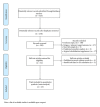Meta-analysis of three different types of fatigue management interventions for people with multiple sclerosis: exercise, education, and medication
- PMID: 24963407
- PMCID: PMC4052049
- DOI: 10.1155/2014/798285
Meta-analysis of three different types of fatigue management interventions for people with multiple sclerosis: exercise, education, and medication
Abstract
Fatigue is a common symptom of multiple sclerosis (MS) with negative impacts extending from general functioning to quality of life. Both the cause and consequences of MS fatigue are considered multidimensional and necessitate multidisciplinary treatment for successful symptom management. Clinical practice guidelines suggest medication and rehabilitation for managing fatigue. This review summarized available research literature about three types of fatigue management interventions (exercise, education, and medication) to provide comprehensive perspective on treatment options and facilitate a comparison of their effectiveness. We researched PubMed, Embase, and CINAHL (August 2013). Search terms included multiple sclerosis, fatigue, energy conservation, Amantadine, Modafinil, and randomized controlled trial. The search identified 230 citations. After the full-text review, 18 rehabilitation and 7 pharmacological trials targeting fatigue were selected. Rehabilitation interventions appeared to have stronger and more significant effects on reducing the impact or severity of patient-reported fatigue compared to medication. Pharmacological agents, including fatigue medication, are important but often do not enable people with MS to cope with their existing disabilities. MS fatigue affects various components of one's health and wellbeing. People with MS experiencing fatigue and their healthcare providers should consider a full spectrum of effective fatigue management interventions, from exercise to educational strategies in conjunction with medication.
Figures
References
-
- Fisk JD, Ritvo PG, Ross L, Haase DA, Marrie TJ, Schlech WF. Measuring the functional impact of fatigue: initial validation of the fatigue impact scale. Clinical Infectious Diseases. 1994;18(supplement 1):S79–S83. - PubMed
-
- Janardhan V, Bakshi R. Quality of life in patients with multiple sclerosis: the impact of fatigue and depression. Journal of the Neurological Sciences. 2002;205(1):51–58. - PubMed
-
- Bakshi R, Shaikh ZA, Miletich RS, et al. Fatigue in multiple sclerosis and its relationship to depression and neurologic disability. Multiple Sclerosis. 2000;6(3):181–185. - PubMed
-
- Chatterton H, Spearing RM. Understanding fatigue in multiple sclerosis. Physical Therapy Reviews. 2006;11(4):235–245.
Publication types
LinkOut - more resources
Full Text Sources
Other Literature Sources
Medical
Molecular Biology Databases



